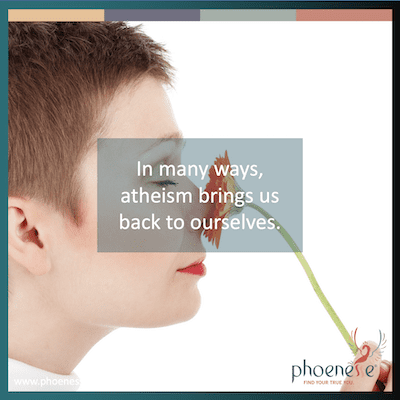
In many ways, atheism brings us back to ourselves.
Evolution is a slow and painstaking process. For us humans, we don’t start out doing college-level coursework during our first incarnation. In fact, during the earliest stages, we are in a state of being without any awareness. We live unto the day, tending to only our immediate needs. Our minds aren’t well developed yet and so we’re not yet equipped to do things like ask questions, doubt, think or discriminate. Sure, we are living in the moment, but we are doing so without much awareness. In order to get to the stage where we are living in the moment with awareness, we’re going to have to do some work.
And so it is that we continue on our merry way, developing our minds and using them to pitch in as needed to contribute to a growing civilization. At first, we use our minds in concrete ways. Only later will we start to use our minds more abstractly. That’s when we’ll start taking on those tougher, more existential questions: Where did I come from? Where will I go? What’s the meaning of life? What am I doing here?
At this point, we may begin to notice the majesty of nature. We catch on that there are natural laws. We start to wonder. This is our first step in starting to relate to our creator. Who came up with these laws? Who made this place, anyways? What kind of a mind could do all this?
With these kinds of questions, we begin forming our first ideas about God. We sense there must be someone out there with infinite wisdom and intelligence, and we feel we must somehow relate to this supreme being.
But as luck would have it, we are still human beings, complete with spiritual and emotional immaturity. In other words, we also have fear and a whole bunch of other problematic feelings, and all these color our concepts about this superior creator.
Since we can’t tease apart our awe of power from our fear of cruelty, we start to fear this God of our own projection.
On the one hand, we are super excited to have an authority that will think for us, decide for us, and thereby be responsible for us. We cling to the notion of such a God in hopes we can be relieved of self-responsibility. On the other hand, we are afraid of life and we feel inadequate to deal with it.
So we project all this onto God.
In other words, we sense the truth of this immensely powerful, wise and resourceful creator-of-all-that-is, but since we can’t tease apart our awe of power from our fear of cruelty, we start to fear this God of our own projection.
Before you know it, we start to appease this made-up God, cajoling and submitting and subduing ourselves in an attempt to please this imaginary God, which is nothing more than a giant shadow puppet created from our own flailing arm gestures. This, then, has become our image of God.
In short, what started off as wonder and a genuine God-experience has morphed into a conflicted and fear-laden caricature of God. In turn, our desire to see something amazing becomes clouded by our very human off-kilter emotions. Eventually, we are no longer relating to a spontaneous, creative experience but to a projection we ourselves have made, which is of ourselves.
Using the mind to outgrow the mind
If we allow our minds to grow in only one direction—instead of using them to resolve their own problems and conflicts—all this will remain hidden from our awareness. As a result, our relationship with God will continue to be a false one. It’s false because it’s built on our wishful thinking and our fears. The longer this goes on, the more false our concept of God will become until our understanding of God is essentially a superstition, with less truth and more dogma.
At this point, we have truly made a farce out of God.
Then one day, our brains wake up and we realize we can’t keep going this way. For our intelligence has grown in the meantime. “No way,” our brain says, “it works this way. It can’t possibly be that God leads life for us. It’s up to us! I am the one who needs to take responsibility here. After all, I have free will.”
This is when the pendulum swings out to the other extreme, causing a counter-reaction to set in. And then where do we go next? We become an atheist, of course.
The story behind atheism
The state of atheism can exist in one of two forms. Either 1) there will be an absolute lack of awareness of life and nature, with no perception of her laws and of the significance of creation, or 2) there will be a reaction to a superstitious version of God, which is a self-projection that negates self-responsibility.
While the second form is still not quite right, it does indicate a further state of development than being in the first bucket. And until we are able to find a more genuine experience of and relationship to God, this is often a necessary transitory place to land.
Along the way, the concept of atheism begins to fall apart.
While we’re here, we can cultivate some helpful faculties we’ll need a little further down the road. Like self-responsibility. This doesn’t make atheism a desirable end-state, but it’s better than a childish, clingy belief in a cotton candy God. Both are stages—although both are false and are at extremes—and yet at every stage, the soul learns.
What begins to develop in the second form of atheism is our willingness to accept responsibility for our lives. We let go of the wished-for hand of God that shuttles us through life and releases us from the consequences of our own mistakes. We also give up the notion that we will be rewarded if we obey a set of rules. Best of all, we release ourselves from the fear that we are going to be punished. In many ways, then, this version of atheism brings us back to ourselves.
But along the way, the concept of atheism begins to fall apart. For if we carry any scientific fact or philosophy until it reaches its logical end or conclusion, we’ll find it less and less possible to hold onto half-truths or untruths. And eventually, our mind is going to begin to question its own motives. We’re going to start looking at ourselves. We’re going to peer deep down inside.
This is how we start developing our awareness, by facing the reality within ourselves. As we proceed in going this way, we will free up deeper and deeper levels of our psyche. And the inevitable outcome of doing that is to have a genuine God-experience.
Such an authentic experience of God is quite different from the childish belief in a self-projected God, which the mind had constructed out of fear and weakness and wishful thinking. Instead, we will live in the present moment without fearing our imperfections. Further, we will no longer fear that God will punish us for them.
And we will be able to see all this without becoming frantic.
What we will come to realize is that the imperfection itself is not what’s harmful, but rather our unawareness of it. Our fear of being punished, that’s what’s harmful. Our pride of wanting to be better than we are, that’s what hurts us.
How to experience God
When we no longer feel any urgency about being above our faults, we will have the calmness to observe them. Then we can come to understand how and why they came into existence. Through this process, we will grow out of our immaturities.
By fostering such an attitude, we make it possible to have a genuine experience of God. Such a God-experience is an experience of being. God isn’t then perceived as a punisher or a rewarder, or one who guides us by taking away our need to make an effort. God simply is, and God’s laws work perfectly for us all. But we can’t come to an awareness of this—to this feeling that God is—if we don’t first face what is in us right now, imperfect and faulty and childish as it might be.
We will begin to experience God as being.
Generally speaking, this is the cycle that humanity goes through. Of course, all this happens at different times on different layers of our personality, so these stages don’t follow neatly one after the other. They overlap, they conflict, and too often we attempt to skip steps and have to backtrack.
Regardless, over time, self-awareness will eventually lead us to the state of being in awareness. Simultaneously, we will begin to experience God as being. But we can’t come to such a stage by avoiding the negativity that is within us now. Nor can we get there by learning concepts, observing practices, or following philosophies or doctrines.
No, if we’re not willing to be with our present confusions, errors and pains, to face them and work to understand them, then we can’t ever be in God. We have to live through what’s here now, even if that means sitting with an unpleasant, albeit temporary, reality.
The harm of old habits
At first, we will only get occasional, vague glimpses of the greater reality. Yet this will inspire us to have a new relationship with God. Needless to say, our whole approach to God will evolve across these stages. The way we pray—meaning the way we talk with God—will also need to adjust.
What often happens, though, is that we’ve inwardly moved onto a new stage, but outwardly we cling to old habitual patterns, patterns we adopted when we were at an earlier stage. As such, we hang onto things we’ve already outgrown.
Our habits have formed tired old grooves in our minds, turning bad experiences into rigid misconceptions.
For the mind is a habit-forming machine. By contrast, experiences that come from being never form habits. Only the mind falls into such traps. As a result, our memory—together with our tendency to form habits—creates a danger for true spiritual experiences.
Our goal, then, is to remain flexible; the way out is to train ourselves to face what is in us right now. For our habits have formed tired old grooves in our minds, turning bad experiences into rigid misconceptions. Habits have caused us to harden our misconceptions into generalizations that are always, at best, half-truths.
There is no reason to feel frantic when we discover such errors buried in our beings. There is no cause for feeling guilty either. Nothing is gained by feeling “I should not.” Such attitudes, in fact, are the greatest barriers of all!
Don’t be afraid to change
We evolve through these cycles for a reason. For the courage, incentive and ability to move along on a spiritual path has to be cultivated and it does not come easily. This is why these phases exist. But they should not be mistaken for ready-made laws.
No, it’s humanity’s inherent rhythms of growth that cannot be hurried. We need encouragement and we need preparation. We need help in directing our attention toward our resistances, instead of doing what we usually do and running away.
Listen deeply to these teachings and then perhaps set them aside for a time. Come back, maybe a month or even a year from now, and discover how the teachings have evolved. Of course the wisdom will remain the same. Hopefully, with some effort, it will be you who have grown and changed.
—The Guide’s wisdom in Jill Loree’s words

Next Chapter • Return to Contents
Read Original Pathwork® Lecture: #105 Humanity’s Relationship to God in Various Stages of Development
We can heal | AFTER THE EGO • BLINDED BY FEAR
The Real. Clear. series | HOLY MOLY • FINDING GOLD • BIBLE ME THIS • THE PULL • PEARLS • GEMS • BONES • NUTSHELLS
The Self. Care. series | SPILLING THE SCRIPT • HEALING THE HURT • DOING THE WORK
More spiritual books | WALKER (a memoir) • SPIRITUAL LAWS • WORD FOR WORD • KEYS (Pathwork Q&As)



